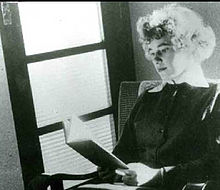Ingrid Jonker
Ingrid Jonker (born September 19, 1933 in Douglas , South Africa, † July 19, 1965 in Cape Town , South Africa) was a South African poet who wrote in Afrikaans . Her poems have been translated into many other languages. She enjoys iconic status in South Africa and is often referred to as the “South African Sylvia Plath ”. Her work has often been compared to that of Anne Sexton .
childhood
Ingrid Jonker was the second daughter of Dr. Abraham Jonker (1905–1966), a National Party politician , and Beatrice Catharina, b. Cilliers (1905-1944). Her father left her mother after she was born. Ingrid Jonker moved with her mother and sister Anna to live with her grandparents Stephanus and Anna Cilliers on a farm near Cape Town. She and her devout grandmother attended numerous religious events, and the language and stories of the Bible made a lasting impression on her. At the age of six she began to write poetry herself.
In August 1944, her mother took her own life. She and her sister moved to Cape Town to live with their father, his third wife and their children. The two sisters were treated as outsiders from the start, which caused a lifelong dispute between Jonker and her father.
At the age of 16 she corresponded with DJ Opperman , whose views shaped her as a poet. She wrote her first collection of poems, Na die somer ("After Summer"), before she was 13 years old. Although various publishers were fundamentally interested in her work, she was advised to wait before publication. She earned her living in print shops, publishing houses and bookshops.
Career as a writer

In 1956, Ontvlugting (“Flucht”), one of her poetry books, was published for the first time. In the same year she married Pieter Venter. Their daughter Simone was born in 1957. They moved to Johannesburg , but three years later the marriage broke up and Jonker and her daughter returned to Cape Town.
Ingrid Jonker belonged to an artist group that rebelled against the censorship of the ruling National Party. However, her father was chairman of the Committee on Censorship Laws. This political opposition intensified the conflict between father and daughter. Because of her anti-apartheid stance, Ingrid Jonker was unable to publish any further books for years. She also suffered from manic depression and was treated several times in psychiatric institutions. During this time she had relationships with the writers Jack Cope and André P. Brink . Brink was married, however, and Cope twenty years older. One of these conditions resulted in a pregnancy that resulted in an abortion, which was another blow to her unstable psyche.
In 1963, however, her volume of poetry Rook en oker appeared , which was enthusiastically received by liberal circles. A year later she was awarded the "Afrikaanse Pers-Boekhandel" prize for this volume. With the prize money she undertook a trip to Europe, which took her to Paris, where she met Breyten Breytenbach . She then became known as a member of the group The Sestigers , which opposed the conservative norms of Afrikaans literature of the time.
Shortly before her death, she began working on another volume of poetry. Some of these poems were later published posthumously in the Kantelson Collection . On July 19, 1965 Ingrid Jonker drowned herself on a beach near Cape Town. When her father heard that her body had been found, he is said to have said: "If I have my way, you can throw it back into the sea."
Honors
Nelson Mandela read Jonker's poem The Child in his opening address to the first freely elected National Assembly in 1994. It is about a child from Nyanga who was shot by police during the apartheid period .
In 2004 Ingrid Jonker was posthumously awarded the Ikhamanga Order in silver by the South African government .
A literary prize was named after Ingrid Jonker, which is given alternately to writers who write in English or Afrikaans.
biography
In 2003 a biography with the title Ingrid Jonker - Beeld van 'n digterslewe ("Ingrid Jonker - picture of a poet's life") by Petrovna Metelerkamp appeared. In addition to Jonker's life story, the book also contains a number of letters and a detailed account of the evening of her death from her friend Bonnie Davidtsz.
- Petrovna Metelerkamp: Ingrid Jonker: beeld van 'n digterslewe. Hemel & See, Vermont 2007, ISBN 978-0-620-28535-3 .
Movie
In 2011 the feature film Black Butterflies about Jonker's life was released. Directed by Paula van der Oest , Carice van Houten figured Ingrid Jonker.
Works
- 1956: Ontvlugting
- 1963: Rook en oker
- posthumously: Kantelson
- posthumous: Black butterflies: selected poems. Human & Rousseau, Cape Town / Pretoria 2007, ISBN 978-0-7981-4892-4 .
Web links
- Portrait at sahistory.org.za (English)
- Information on Ikhamanga Medal in Silver for Jonker (English)
- Ingrid Jonker on boeken.nl (Dutch)
- Ingrid Jonker Memorial Page at sthp.saha.org.za (English)
- Website for film Ingrid Jonker - Her Life and Times ( Memento of July 13, 2011 in the Internet Archive )
Individual evidence
- ↑ Ingrid Jonker at presidency.gov.za (English), accessed April 16, 2018
| personal data | |
|---|---|
| SURNAME | Jonker, Ingrid |
| BRIEF DESCRIPTION | South African poet |
| DATE OF BIRTH | September 19, 1933 |
| PLACE OF BIRTH | Douglas , South Africa |
| DATE OF DEATH | July 19, 1965 |
| Place of death | Cape Town , South Africa |
